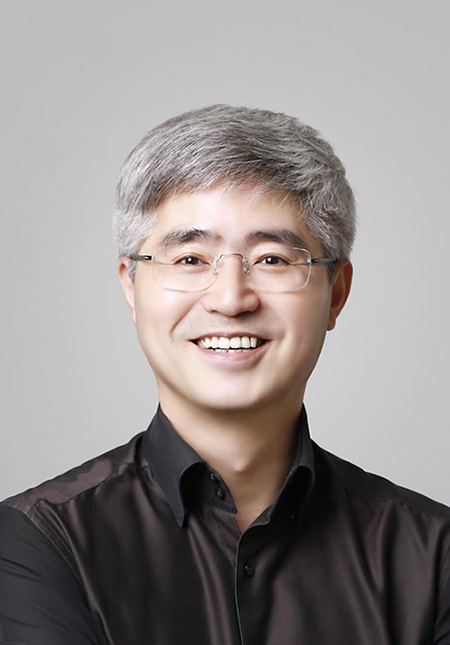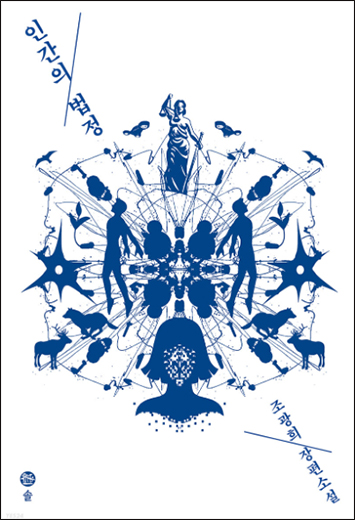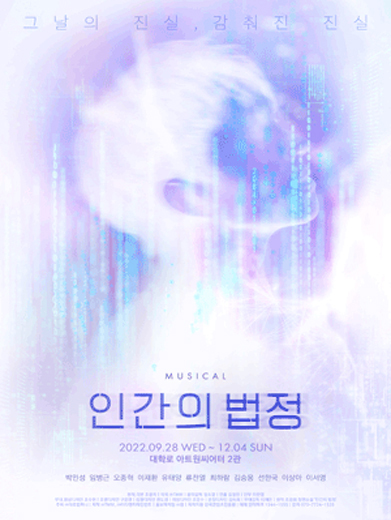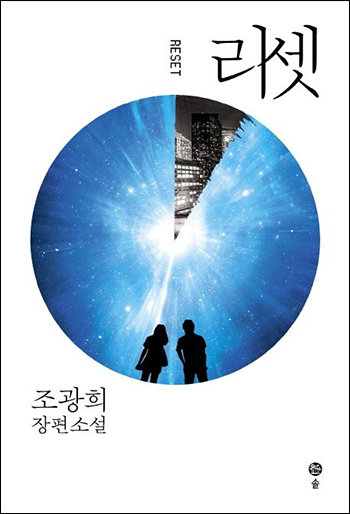|
Korean Authors
Writer Cho Kwang-Hee A Lawyer, Writer, Novelist, and scriptwriter...
2023.03.13
Writer Cho Kwang-Hee is a lawyer, writer, novelist, and scriptwriter for musicals and dramas. He has been breaking down the boundaries between fields and genres and walking on his own distinct path. It would be normal to feel overwhelmed by doing one thing, but he says he is eager to spend more time as a writer. He says he feels so happy when his stories are reborn as a new genre. Following is an interview with Cho, who never stops taking on new challenges, as can be seen in his preparation for the upcoming meet & greet with international readers in April.

It’s an honor to have you on K-Book Trends. Please say hello to our subscribers and briefly introduce yourself.
Hello, everyone. I’m writer Cho Kwang-Hee. The title “writer” is still a bit odd to me as I’ve been living as a lawyer for most of my lifetime. I worked as a lawyer specializing in culture, art, and entertainment in Korea, and a few years ago, I became an author writing fiction, screenplays, and columns. So it’s very thrilling to be meeting you all through this written interview.

So, you’re a lawyer, a film producer, and a novelist. You’ve been crossing various fields, from law to video and publishing. What does your activity as a writer mean to you personally?
Being a lawyer was something I chose to support my life. I’ve felt a great sense of achievement as a lawyer. People in the cultural and art industries, such as writers, artists, and producers, are my major clients. I think my pursuit of life and preferences have made me work with these people, but I also believe that those works have led me to live as a creator. In the later part of life, I’m thinking of being more devoted to my career as a writer, reducing the proportion of legal work. Expressing what I’ve thought, felt, and experienced in my life, I look forward to interacting with people living in the same era.
I’m thinking of spending more time as a writer from now on, communicating with people.

Recently, there has been an increasing number of “part-time writers” with different career backgrounds in Korea. Your days must be very short of time just working as a lawyer. How do you allocate time to writing, and how do you keep a balance between the two jobs?
Until now, I have been spending my daytime as a lawyer, writing in the evenings and on the weekends. This year, I’m thinking of spending half of my time in legal work, and another half in writing. Writing is not just a result of thinking and imagination – it requires fertilizer called “experience” that I cumulate through the wide scope of social activities I’m engaged in. As legal practices are deeply related to writing in that sense, I’m thinking of working as both a lawyer and writer in the future as well.

Humans and androids appear in your book A Human Court (Sol). Through the interesting topic of “a trial between human vs. android,” what message did you intend to deliver? Please tell us about its background, and how you came to start the story.
I had several interviews with media outlets after I published my first fiction Reset (Sol). The journalists asked what I was planning for the next work, and answering that question, “a Sci-Fi courtroom drama where an android kills its owner and is put on trial” came to my mind. It was actually not easy to write the story, but with in-depth research on AI and the nature of humanity, I could develop my ideas and complete the book.

It is no longer unfamiliar to be living with cutting-edge technologies with smartphones at the front. For example, a chatbot called “Chat GPT” was a hot issue recently, which aroused anticipation and concerns about plagiarism at the same time. What do you think about this era? Do you think that humans and robots with intelligence can co-exist?
In the era of the Industrial Revolution, the emergence of machines that could replace human labor brought about a great deal of confusion in society. I don’t think that the development of technology and science should be approached with blind faith or a denouncing view. It is important to make the best out of their positive possibilities, while staying careful with the possible negative consequences, and setting up responsive measures. It’s the same with AI. Humanity has no way but to co-exist with AI, and the power should be used properly for the development of humanity. Also, we should deeply research and gather wisdom to respond to the changes that technology will bring to our society, such as the reduced role of humans, reengineering of the labor market, challenges to the nature of creativity, and the likelihood of AI threatening humanity’s survival. If we do so, civilization will take another step to a new level.
The book cover and musical poster of A Human Court

A Human Court has received so much love that it was adapted into a musical. It is also said that it is likely to be made into a drama. How did you feel when your work was reborn as a different type of media?
I’ve thought about the possibility of the book being made into a movie or drama. But, musical, I didn’t expect that. Seeing my stories being reborn in a new genre, I was really happy and learned a lot about the differences and commonalities between different genres.

We heard that you wrote the screenplay for the musical yourself. There must have been difficulties as the way musicals work is different from a novel. What did you particularly focus on when writing the screenplay?
First of all, novels and screenplays are different. Novels have the advantage of being able to go deeper into characters, thoughts, and emotions, and are freer in terms of narrative development. On the other hand, screenplays have a stricter narrative structure. Also, musical screenplays, among all others, have more things you should keep in mind – the stage and music. I was familiar with the screenplay format of films and dramas, but I had little knowledge about that of a musical. So, writing the screenplay for the musical was also a process of learning about a new genre at the same time. I could finish the work with the help of the music director, musical producers, actors/actresses, and staff members that I worked with.
It gave me great pleasure to see my story reborn in a new genre.

A Human Court was introduced in several countries, including Vietnam. How was the response from international readers?
I couldn’t check their response as the translation of the book has just begun to be published. The German edition is scheduled to be published in March, and I’m planning to visit German-speaking countries in April. I’m going to 7 countries, including Germany, Switzerland, and Austria, where I’ll be meeting readers at universities, bookstores, and cultural centers.I look forward to seeing what the global readers think about my book.
Reset

Your first full-length novel Reset also has legal elements. The protagonist is, in fact, a lawyer. Does this reflect your experiences as a lawyer? Why did you write a story about law as your first novel?
As it was my first novel, I naturally chose a world I knew well. It wasn’t a strategic choice – I just had so many things to say about what I’ve experienced as a lawyer. After its publication, I could hear many reviews from readers that the descriptions of lawyers and courtrooms were vivid and persuasive.

We look forward to your activities in various fields in the future. What are your plans or goals?
While working as a lawyer, I’m thinking of continuing to write novels and screenplays for films and dramas. There’s a draft for a novel that I’m currently fixing, and I have ideas for about three more novels. And, while Korean dramas are greatly loved in the world, I’m writing screenplays for dramas as I got requests from drama production companies. So, for four or five years from now on, I’m thinking of completing the works I’ve planned and meeting readers as well as audiences.
#Cho Kwang-Hee#Novelist#Lawyer#A Human Court |
Pre Megazine
-

Jakkajungsin Publishing Co.
VOL.69
2024.04 -

Writer Yun Jung-Eun
VOL.69
2024.04 -

Jumping Books Publishing House
VOL.68
2024.03 -

Writer Kim Hwa-Jin
VOL.68
2024.03 -

Publisher Hyohyung
VOL.67
2024.02 -

Writer Minha
VOL.67
2024.02 -

Almond Publishing
VOL.66
2024.01 -

Writer Kwon Jung-Min
VOL.66
2024.01 -

Hakgojae Publishers
VOL.65
2023.12 -

Writer Kim Hye-Jung
VOL.65
2023.12 -

Eidos Publishing House
VOL.64
2023.11 -

Writer Hwang In-Chan
VOL.64
2023.11 -

Munhakdongne
VOL.63
2023.10 -

Writer Chang Kang-myoung
VOL.63
2023.10 -

Happywell Publishing
VOL.62
2023.09 -

Writer Baik Soulinne
VOL.62
2023.09 -

Dasan Contents Group (Dasan Books)
VOL.61
2023.08 -

Writer Lim Kyoung-Sun
VOL.61
2023.08 -

SpringSunshine Publishing Co.
VOL.60
2023.07 -

Writer Lee Kyung-Hye
VOL.60
2023.07 -

Human Cube
VOL.59
2023.06 -

Doctor Jeong Jae-Seung
VOL.59
2023.06 -

Anonbooks
VOL.58
2023.05 -

Writer Son Bo-Mi
VOL.58
2023.05 -

Namhaebomnal
VOL.57
2023.04 -

Writer Kim Bo-Young
VOL.57
2023.04 -

Hugo Publishing
VOL.56
2023.03 -

Writer Cho Kwang-Hee
VOL.56
2023.03 -

Balgeunmirae Publishing Co.
VOL.55
2023.02 -

Writer Lee Byung-Ryul
VOL.55
2023.02 -

Wisdom House, Inc
VOL.54
2023.01 -

Writer Jeong Jia
VOL.54
2023.01 -

Humanitas
VOL.53
2022.12 -

Writer Kim Yeon-Su
VOL.53
2022.12 -

Songsongbooks
VOL.52
2022.11 -

Writer Eun Hee-Kyung
VOL.52
2022.11 -

Bombom Publishing Co.
VOL.51
2022.10 -

Writer Jiwon Yu
VOL.51
2022.10 -

Hangilsa Publishing Co., Ltd.
VOL.50
2022.09 -

Writer Kim Won-Young
VOL.50
2022.09 -

Moksu Publishing Company
VOL.49
2022.08 -

Writer Yoo Sun-Kyong
VOL.49
2022.08 -

Next Wave
VOL.48
2022.07 -

Writer Park Sang-Young
VOL.48
2022.07 -

A Thousand Hopes
VOL.47
2022.06 -

Writer Bora Chung
VOL.47
2022.06 -

Woongjin ThinkBig
VOL.46
2022.05 -

Dr. Oh Eun-Young
VOL.46
2022.05 -

JECHEOLSO Publishing House
VOL.45
2022.04 -

Writer Jang Ryu-Jin
VOL.45
2022.04 -

Changbi Publishers
VOL.44
2022.03 -

Writer Kim Ho-Yeon
VOL.44
2022.03 -

Mati Books
VOL.43
2022.02 -

Writer Lee Kkoch-Nim
VOL.43
2022.02 -

Picturebook Gongjackso
VOL.42
2022.01 -

Writer Kim Sang-Wook
VOL.42
2022.01 -

Writer So-yeon Park
VOL.42
2022.01 -

Writer Yoo Eun sil
VOL.42
2022.01 -

Kungree Press
VOL.41
2021.12 -

Writer Kim Lily
VOL.41
2021.12 -

Writer Park Yeon-jun
VOL.41
2021.12 -

Writer Yi Hyeon
VOL.41
2021.12 -

A deeper world told through picture books 'Iyagikot Publishing (Story Flower)'
VOL.12
2019.06 -

Author Jeon Min-hee
VOL.12
2019.06 -

Illustrator Kim Hwan-Young
VOL.13
2019.07 -

Travelers sailing through the sea of knowledge - 'Across Publishing Group Inc.'
VOL.13
2019.07 -

Genre Novel Publisher 'Arzak Livres'
VOL.14
2019.08 -

Author Lee Yong-han
VOL.14
2019.08 -

Wookwan Sunim
VOL.15
2019.09 -

East-Asia Publishing
VOL.15
2019.09 -

Author Jo Jung-rae
VOL.16
2019.10 -

EunHaeng NaMu Publishing
VOL.16
2019.10 -

Writer Heo Kyo bum
VOL.40
2021.11 -

Writer Kim So-Young
VOL.40
2021.11 -

Author-illustrator Kim Sang Keun
VOL.40
2021.11 -

ACHIMDAL BOOKS
VOL.40
2021.11 -

Author Kang Gyeong-su
VOL.17
2019.11 -

Moonji Publishing Belongs to the Literary Community
VOL.17
2019.11 -

Author Kim Yun-jeong
VOL.18
2019.12 -

I-Seum
VOL.18
2019.12 -

Kim Cho-Yeop
VOL.19
2020.02 -

Creating a window into the future with books
VOL.19
2020.02 -

Author Serang Chung
VOL.20
2020.03 -

Hey Uhm
VOL.20
2020.03 -

Writer Lim Hong-Tek
VOL.21
2020.04 -

BIR
VOL.21
2020.04 -

Writer Song Mikyoung
VOL.39
2021.10 -

Author-illustrator Kim Dong Su
VOL.39
2021.10 -

Writer Lee Seula
VOL.39
2021.10 -

Tabi Books
VOL.39
2021.10 -

Writer Kim Soo-hyun
VOL.38
2021.09 -

Author-illustrator Lee Myoung Ae
VOL.38
2021.09 -

Writer Hwang Sunmi
VOL.38
2021.09 -

Kidari Publishing Co.
VOL.38
2021.09 -

Writer Sohn Won-Pyung
VOL.22
2020.05 -

Woods of Mind's Books
VOL.22
2020.05 -

Writer Heungeul
VOL.23
2020.06 -

Gloyeon
VOL.23
2020.06 -

Maumsanchaek
VOL.24
2020.07 -

Winners of the 2021 Bologna Ragazzi Award
VOL.37
2021.08 -

Picture book artist Lee Suzy
VOL.37
2021.08 -

Author-illustrator Yi Gee Eun
VOL.37
2021.08 -

Hubble
VOL.37
2021.08 -

Writer Baek Se-Hee
VOL.25
2020.08 -

Bearbooks Inc.
VOL.25
2020.08 -

Author Baek Hee-Na
VOL.26
2020.09 -

Yuksabipyoungsa
VOL.26
2020.09 -

Writer Kang Hwa-Gil
VOL.27
2020.10 -

Kinderland (Bandal)
VOL.27
2020.10 -

Writer Ha wann
VOL.36
2021.07 -

Author-illustrator Myung Soojung
VOL.36
2021.07 -

Writer Jung Yeo-Wool
VOL.36
2021.07 -

Publisher EcoLivres
VOL.36
2021.07 -

Writer Lee Geumi
VOL.28
2020.11 -

Sakyejul
VOL.28
2020.11 -

Writer Kim Keum-Hee
VOL.29
2020.12 -

Geulhangari
VOL.29
2020.12 -

Writer Cheon Seon-Ran
VOL.30
2021.01 -

Hyang Publishing House
VOL.30
2021.01 -

Writer Lee Hee-Young
VOL.31
2021.02 -

Sanzini
VOL.31
2021.02 -

Publisher Prunsoop
VOL.32
2021.03 -

Writer Sim Yun-Kyung
VOL.32
2021.03 -

Hanbit Media
VOL.35
2021.06 -

Hyeonamsa
VOL.33
2021.04 -

Author-illustrator Noh Inkyung
VOL.33
2021.04 -

Writer Cho Won-Jae
VOL.35
2021.06 -

Writer Kim Jung-Mi
VOL.34
2021.05 -

Safehouse Inc.
VOL.34
2021.05













